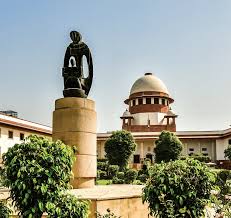Counsel for the appellants contended before the High Court that since most of the witnesses were close relatives or interested witness, hence their testimonies could not be relied upon, which contention was not accepted, not only in view of the unimpeachable creditworthiness of the witnesses, fully inspiring in confidence, but also in the light of principles of law enunciated by this Court. On facts, the Court also observed that PW-3, is not a relative at all, and Khorbahrin Bai (PW-16) although is a relative of the deceased but is not a close relative. Also, even though PW-17 is the wife of the deceased, nothing elicited prompting her testimony to be unbelievable. (Para 7)
Before us, the aforesaid convict-appellants have assailed the impugned judgment on four fronts-
(a) Inordinate delay in filing of the First Information Report (F.I.R.) (Ex.15) introduces to the case, the possibility of improvements thereby casting doubt on the version of the prosecution;
(b) the testimonies of the witnesses of the prosecution being contradictory, hence unreliable;\
(c) the deceased being a history-sheeter, having numerous cases pending against him, hence equal probability that someone other than the convict(s)-appellant(s) favouring and wanting, his elimination; and
(d) that the accused persons were, in fact, not at the scene of the crime and their plea of alibi is probable. (Para 8)
In respect of the first contention put forth by the convictappellants it is seen from the record that the FIR was registered about two hours after the incident having taken place on 17.04.1988 at about 08.00 a.m. The document itself records the time of incident as being 8.15 a.m. and the time of report as being 11.00 a.m. The testimony of PW-3 at whose instance the FIR was recorded, shows that out of fear and having sustained numerous injuries, he ran from the place of occurrence and hid in the house of Baisakhu Kewat and only emerged therefrom two hours later.In such a situation, delay in filing of the FIR cannot be said to be fatal to the case of the prosecution more so in view of the injuries sustained by him; the place of occurrence being a remote village area and that the version of events was dictated to the police by this witness only upon their reaching his place of shelter. To us it does not appear to be a case of prior consultation; discussion; deliberation or improvements. (Para 14)
Another defence taken by the convict-appellants is that of the plea of alibi. (Para 18)
In our considered view, both these defence witnesses do not conclusively establish the plea of alibi, based on the principle of preponderance of probability as their statements stand unsupported by any other corroborative evidence. (Para 21)
We find that for the plea of alibi to be established, something other than a mere ocular statement ought to have been present. After all, the prosecution has relied on the statement of eyewitnesses to establish its case against the convict-appellants leading to the unrefuted conclusion that convict-appellants were present on the spot of the crime and had indeed caused injuries unto the deceased as also PW-3 with Lathis and Tabbal on various and vital parts of their bodies. (Para 22)
It may be true that the deceased Chetram was a historysheeter and had scores of criminal cases pending against him or cases in which he was involved. However, such fact is unsubstantiated on record for no detail whatsoever stands provided in respect of such cases involving the deceased. Be that as it may, simply because the deceased had a chequered past which constituted several run-ins with the law, Courts cannot give benefit thereof, particularly when such claims are bald assertions, to those accused of committing such a person’s murder. And in any event, such a plea is merely presumptuous. (Para 24)
SUPREME COURT OF INDIA
2023 STPL(Web) 332 SC
[2023 INSC 895]
Kamal Prasad & Ors. Vs. State Of Madhya Pradesh (Now State Of Chhattisgarh)
Criminal Appeal No. 1578 of 2012-Decided on 10-10-2023
https://stpllaw.in/wp-content/uploads/2023/10/2023-STPLWeb-332-SC.pdf







